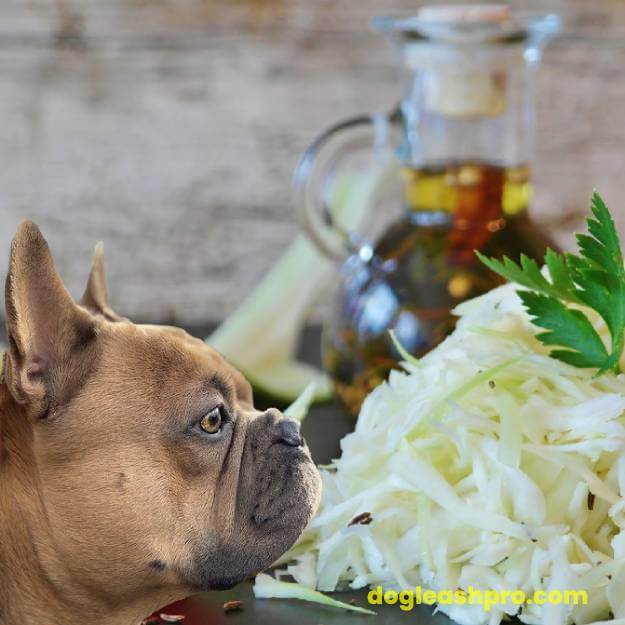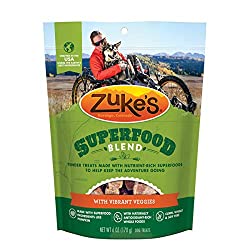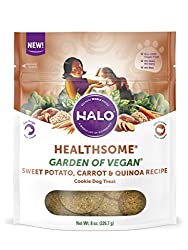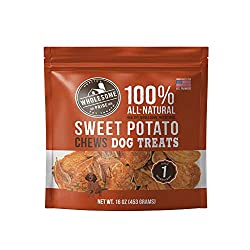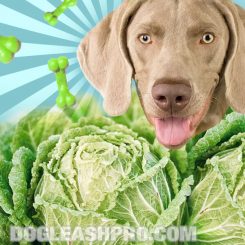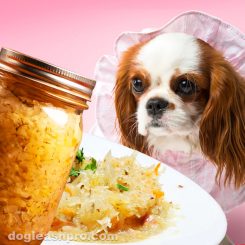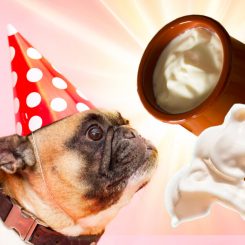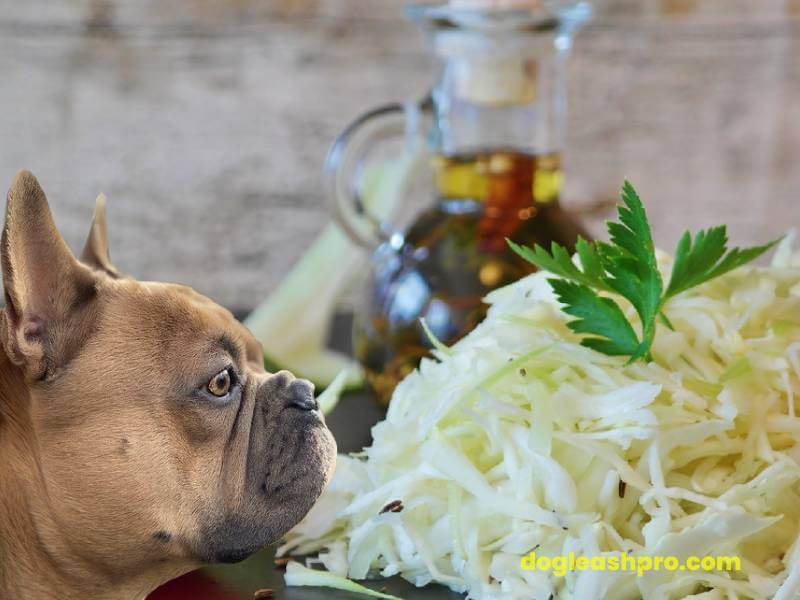
Generally, a small amount of Coleslaw is fine if dogs eat it accidentally. While dogs can eat a small amount of Coleslaw, they should not have it. Coleslaw does not provide any nutritional benefit for dogs and may even make them sick.
Like many human foods, Coleslaw is not made for dog consumption. There are other healthier vegetable options like Brussel sprouts that are more suitable for dogs to eat.
Before we jump to a conclusion, let’s dig in to find out why dogs shouldn’t have Coleslaw, which ingredient in this dish is toxic to your canine, and what canine-friendly food alternatives to feed your four-legged friends instead.
Table of Contents
What is Coleslaw?
Coleslaw is a side dish to meat dishes like barbecued meats and fried chicken. This side dish is enjoyed around the world, particularly in the United States, United Kingdom, Italy, Poland, Sweden, Russia, and Germany.
Like Egg salad, the shredded strips of raw cabbage are mixed with a good amount of mayonnaise and a few other ingredients. Sometimes, people will use vinaigrette instead of mayonnaise.
Coleslaw or cabbage salad came from the Dutch term, koolsla. It’s very common for people to use Coleslaw in Reuben sandwiches instead of sauerkraut. You’ll also see Coleslaw added into hamburgers or on top of hot dogs with mustard and chili.
What is Coleslaw made of?
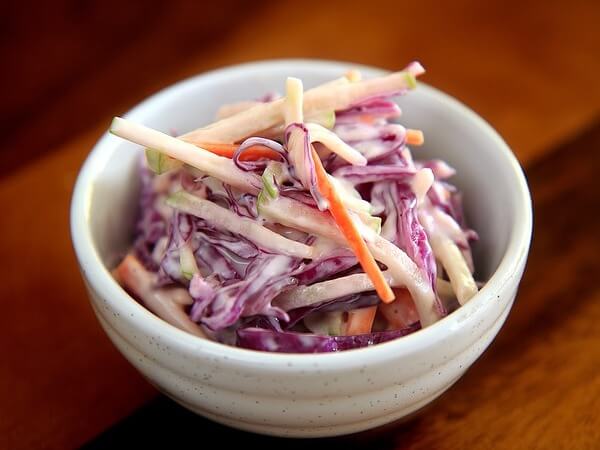
The main ingredient in Coleslaw is cabbage. Many people will also add a variety of ingredients including shredded red cabbage, carrots, pepper, onion, cheese, and mixed with dairy products such as mayonnaise or cream. For added flavor, it’s common to add seasonings to it as well including celery seed.
Here in the US, Coleslaw contains mayonnaise or mayonnaise substitutes, buttermilk, carrot. You may also find Coleslaw with vinegar or mustard instead of mayonnaise or dairy products. For example, red Coleslaw or barbecue Coleslaw uses vinegar and ketchup instead of mayonnaise.
If you visit the southern US, it’s common to find buttermilk, sour cream, or cream added to Coleslaw. In fact, you’ll find buttermilk Coleslaw as a side dish there.
In the UK, the Coleslaw dish contains onion and carrot mixed with cabbage and it is added with salad cream or mayonnaise. Some will add walnuts, raisins, sultanas, and grated cheese to this side dish.
In summary, the classic Coleslaw ingredients you’ll find in the US and UK are:
- Cabbage (44%)
- Mayonnaise (35%)
- Carrots (13%)
- Double Cream or Milk (2%)
- Onions (1%)
These main ingredients are then added with the following:
- Rapeseed oil.
- Pasteurized whole egg.
- Sugar.
- White wine vinegar or spirit vinegar.
- Salt.
- Stabilizers such as guar gum and xanthan gum.
- Mustard powder.
- Preservative such as potassium sorbate.
- Carotenes for color.
- Additional flavors.
How to tell if Coleslaw is bad for dogs
As you can see from the above list of ingredients, there are some ingredients that are very toxic to dogs. They include:
- Onions
- Cream
- Raw cabbage
- Mayonnaise dressing
- Salt
- Sugar
- Preservatives
Let’s dive deeper into these ingredients and find out why they are harmful to dogs.
Onions
While onions are only a small portion of the Coleslaw dish, even a little bit of onion can do harm to your pooch. Since onions come from the allium family, it contains a toxic substance that is toxic to dogs so eating a few tiny bites of onion can cause onion poisoning and be very deadly.
The consequences of eating onions could cause damage to a dog’s red blood cells and eventually lead to anemia in dogs. If the Coleslaw dish contains any onions, do not give Coleslaw to your pooch.
Hint: Speaking of onions, another human food that dogs should avoid is Pepperoni because it contains a high amount of onion that is harmful to our furry friend’s health.
Raw cabbage
Raw cabbage is fine if you give your dogs small quantities of it. However, the main ingredient in Coleslaw is raw cabbage, and consuming a lot of raw cabbage can cause an upset stomach. It can unfortunately also suppress your dog’s thyroid gland due to its natural compound called thiocyanate.
Because of this, it’s best not to feed your pooch any Coleslaw.
If you feed your pooch raw cabbage regularly and in large quantities, he may start to have hypothyroidism, which can be uncomfortable for dogs since it can cause hair loss in the back of your pup’s tail or rear legs. Their coat fur may become thin and their skin may become flaky with black patches.
In fact, some dogs may start to gain weight and have a slower heart rate.
Mayonnaise dressing
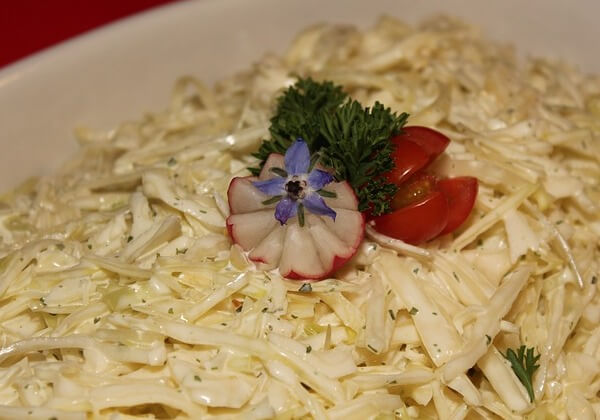
Mayonnaise dressing is high in fats and sugar. The flavor is also very rich. While mayonnaise is safe, it is not good for your canine’s stomach and digestive system. In fact, feeding your furry friends mayonnaise regularly could lead to weight gain and eventually canine obesity.
If your four-legged friends are overweight, diabetic, allergic to dairy, or has pancreatitis, avoid serving Coleslaw to them. When our canine companions are overweight, they may start to develop other health problems including heart issues and joint pressure and pain.
Cream
Cream is a dairy product and can be hard on the dog’s digestive system. Many canines are lactose-intolerant so they lack the lactase enzymes that are responsible for breaking down dairy products.
When dogs that are lactose-intolerant consume cream, not only can’t they digest the cream properly, but they may even experience the following symptoms:
- Vomiting (the dog’s body will naturally try to purge what it considers dangerous to its system).
- Diarrhea (to get rid of the cream from its body).
- Upset stomach.
- Inflammation of the gastrointestinal tract.
Hint: If your canine friends are lactose-intolerant, they should also avoid Sour cream and other dairy products.
Salt and Sugar
Seasonings like salt or sweeteners like sugar are not good for dogs. In fact, consuming so much salt can cause salt poisoning in dogs and too much sugar can cause weight gain and diabetes.
If you add a lot of salt or sugar in your Coleslaw or if the store-bought Coleslaw contains way too much salt and sugar, please do not feed Coleslaw to your furry friends.
Preservatives
Preservatives, especially artificial preservatives are harmful to dogs as they expose your pups to toxic chemicals. Consuming artificial preservative daily can affect your dog’s liver and cause liver damage or cancer.
Coleslaw provides no nutritional benefit for dogs
Generally, it’s best to feed our canine dog food that is filled with minerals, nutrients, vitamins and protein. With Coleslaw, it does not provide any nutrient that is beneficial for our pooch.
Instead, it is high in salt, sugar, and fat. There’s not much protein or fiber in Coleslaw either.
High calories in Coleslaw
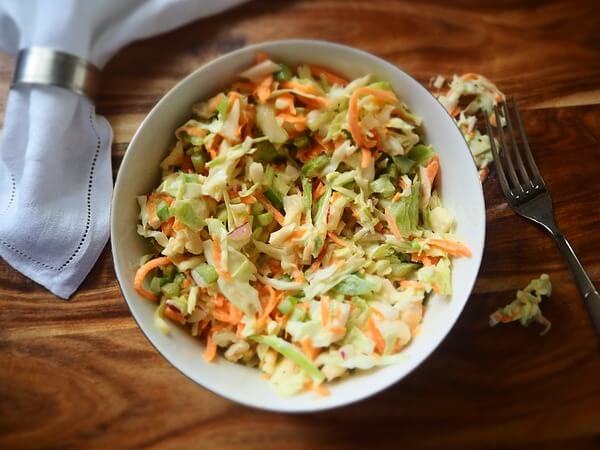
As you may be aware, a dog should have only 25 calories per day for every pound they weigh. Let’s take my two pups as an example:
- Female Chihuahua is 6 pounds: Should not eat more than 150 calories per day.
- Female Yellow Labrador is 60 pounds: Should not eat more than 1500 calories per day.
Remember that when it comes to dog treats or snacks, they should only account for 10% of your dog’s food diet every day.
If you get Coleslaw from your local deli or in supermarkets, a 100g of Coleslaw bag usually averages around 165 calories. This means that chomping on this Coleslaw could significantly affect your smaller dog breed like a Chihuahua while it may not have such an impact on your larger breed such as Yellow Labrador.
What happens if my dog eats a lot of Coleslaw?
If your pup eats just a little bit of Coleslaw, he should be fine, but make sure to consult with your veterinarian to make sure.
However, if your pooch consumes a lot of Coleslaw, he may have food poisoning and experience the following symptoms:
- Vomiting.
- Diarrhea.
- Upset stomach from the dairy products and toxic ingredients.
- Passing gas frequently.
- Hard shredded cabbage can tear your dog’s throat or cause choking in dogs.
Visit your veterinarian right away if your furry friend is experiencing any of these symptoms.
Canine-friendly alternatives to Coleslaw
When I’m enjoying my Coleslaw with my KFC chicken, both my Labrador and my Chihuahua are watching me with their puppy eyes. Instead of giving them my Coleslaw, I feed them these dog snacks instead:
So, can dogs eat Coleslaw?
Dogs should not eat Coleslaw as it is high in fat, salt, and sugar. It also does not provide any nutritional benefits to dogs. Coleslaw is a human food so you should avoid feeding it to your canines.
The toxic ingredients in Coleslaw will cause an upset stomach and digestive issues in dogs so it is best to keep this side dish away from your pooch.
Related Questions
Coleslaw in small quantities is not toxic to dogs. However, eating a lot of Coleslaw can cause health issues in dogs such as an upset stomach and may even suppress your pup’s thyroid gland. This is because Coleslaw is mainly made of both raw cabbage and red cabbage. Both of these raw cabbages contain a harmful chemical called thiocyanate that can be toxic to dogs.
Thiocyanate is a chemical that is dangerous to dogs because it can suppress their thyroid hormone. Thyroid hormones help metabolize the food in your canine’s body and are involved in the day to day metabolic functions of your dog’s organs and tissues.
Suppressing the thyroid hormone means that the dogs can start to show changes in behaviors such as gaining weight, feeling lethargic and doesn’t have the desire to exercise, shedding excessively which leads to bald spots with very dry and dull hair left on the bodies, having slower heart rate, and being more susceptible to ear infections or skin infections.
You may even notice a lot of dark pigmentation on their skin because they don’t have enough fur to protect them from the sun.
This is why it is best to feed your canine friends fully cooked cabbage. Cooking the cabbage helps to deactivate thiocyanate and prevent this chemical from affecting your dog’s thyroid gland.
Cooked cabbage is also softer for your furry friends to eat and easier to digest. You won’t have to worry about your pup choking on the hard raw cabbage.
Cabbage is packed with antioxidants and vitamins. Including a little bit of cooked red cabbage into your pups’ diet or treat can help them maintain healthy fur and skin. Be sure to feed cooked cabbage to your canine companion as an occasional treat and not on a regular basis.
DISCLAIMER: THIS WEBSITE DOES NOT PROVIDE MEDICAL ADVICE
The information, including but not limited to, text, graphics, images and other material contained on this website are for informational purposes only. No material on this site is intended to be a substitute for professional veterinary advice, diagnosis, or treatment. Always seek the advice of your veterinarian or other qualified health care provider with any questions you may have regarding dietary needs.
Resources:
https://en.wikipedia.org/wiki/Coleslaw
https://vcahospitals.com/know-your-pet/onion-garlic-chive-and-leek-toxicity-in-dogs

With over five years of specialized experience as an animal writer, my expertise lies in dog nutrition, health, behavior, grooming, and training. I am dedicated to delivering helpful and informative content that caters to the well-being of our furry friends. My primary goal is to empower pet owners with knowledge and ensure our canine companions thrive in health and happiness. In my free time, I love volunteering at local dog rescue centers.
